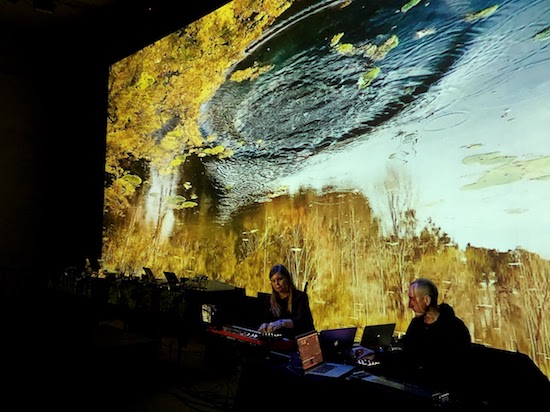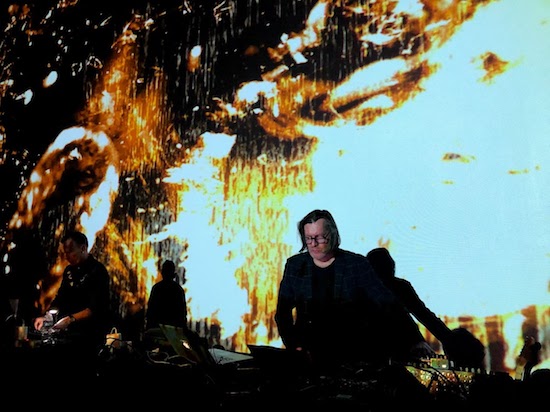It’s an odd feeling. You sense it just enough in the air, where it’s less some dread disease and more just unsureness, unease. It’s the first gray and drizzling night in San Francisco for a few weeks, staff at the venue, the Gray Area, wear gloves and post signs about washing your hands while people in line discuss the mayor’s request to suspend non-essential gatherings for at lead two weeks. That includes concerts, yet here we are.
Courtesy of CT::SWaM’s opening audio set, the crackling pulsing sound of Yuzo Kako’s ‘Fora’, an overlay of relentless pulses and scattered beats matched with a weird fugue state ambience, seems almost too perfect as a result, while a cruise ship waits off the coast as tests are being run. A friend on Twitter talks about her loved one in Wuhan, stuck there for a month and a half while she can only send best from the outside. Who knows how quickly that scenario replicates?
The Recombinant Festival has been running for a few years now, and this in ways is my follow-up to reporting on the 2018 version. It’s a nicely varied night on the boards tonight – not everything is murmuring electronic nervousness, even or especially with Fennesz doing a set later. And of course it makes sense we’re all, for now, slightly isolated ghosts on the floor, attending a festival subtitled Clouds Of Confoundment. Who knows how much we actually want to be near each other, as Kako’s work continues to clatter and stretch, a heartbeat hitting irregularities that stops and moves into Kristina Warren’s ‘Almost Completely Lucid’, piercing tones, skittering beeps and rumbles in the distance, followed by Miguel A. Garcia’s hums and alien breathing on ‘Dissolve’ and more, a cavalcade of nervousness.
Saariselka, the collaboration between two local favourites of mine, Marielle Jakobsens and Chuck Johnson, almost ease into their performance, a gentler contrast to the bold abstract anger before. As images of shimmering water and reflections of sky and trees play out behind them, Johnson’s steel guitar interprets the sense of ‘Americana’ as hybrid Arcadia. This is matched by sweet keyboard melodies and computer elements the pair provide. There’s a small hint of Eno in Apollo mode but this is their own beauty, not so much signifier as exploration, even as the forest setting of the backdrop suggests the legendary GAS set from this festival 2018, if more pristine. They perform with quiet focus, keeping an eye and an ear on the other as much as launching into their own parts with a mix of reverie and soft rapture. The whole feels like a warm glowing orb always shining outward and upward.
The Spider Compass Good Crime Band are a thing. Perhaps more apt to say they are a caution. Set up in the middle of the floor Lightning Bolt style, they make music that to my mind sounds like a slightly soporific Korla Pandit playing a late night bar spiked with the kind of random noises once again suggesting Eno – early Roxy Eno that is – plus loopy non-hip hop sampling and production jamming. That this is performed by two individuals dressed as mutated giraffe aliens bathed in a lurid red light seems in keeping with everything. They clearly know exactly what they are doing, of course, and it keeps the evening from being all shades of serious. By the time they seem to be doing some sort of outer space reggae, madness has happily taken its toll.

Britton Powell opens with a gong. Not a Queen-size gong but amid the ambience and the overlapping films flanking him on the back stage, a gong nonetheless. One set of water ripples and wakes after another, he faces away from his centrally located keyboard/laptop setup to play and layer his rolling roil on the gong as deep drones swell and overwhelm. Imagery shifts to cities, clouds, ads, steam, screens in screens, a suggestive layering that one can easily project onto. By now facing the audience there’s a sense he’s taken command and the shuddering high speed punch and pulse of sound and light feel increasingly overwhelming even at the opposite side of the room. Even as it slowly winds down both audio and visual there’s a sense of rumbling power, drum hits punctuated with the kind of crack that opens Blade Runner before concluding in the final burst of a crescendo.
And so, Fennesz. In this case accompanied by Lillevan, which I think brought out the best even more — like Saariselka, two good artists at work together can mean something when the stars are right. Having followed much of Fennesz’s work over two decades, both solo and in collaboration, it all felt just right. He used his guitar sparingly while otherwise concentrating on and moving fluidly between a number of computers, effect pedals and boards, all while cascades of sound crashed, swooped and overwhelmed. A good sound system lets one feel music but this really felt deep, the kind of thing that showed how he built on ideas that came to the fore in the 90s and then created his own universe, feedback subsumed into effect. Lillevan’s own contributions with the constantly changing film work, along with further touches he added from his own computer setup, fed on and fleshed out the journey. We were a crowd broad enough to engage ranging from focused contemplation to the young person next to me clearly drunk, a little excited and just lost in the rapture of it all — but I didn’t complain about that once, because why not be lost in that kind of a maelstrom?
The evening wasn’t done yet but the hour was late and I needed to hunker down — much as the city itself seems to be starting to do now in a slightly more unsettled world than before, which is saying something and a half. But Recombinant showed again what a good small festival can do with the right location and inspired lineup, a reminder that you can still get lost in music in the best possible way, driving whatever’s taken up space in your head away for at least a little while, once again.


